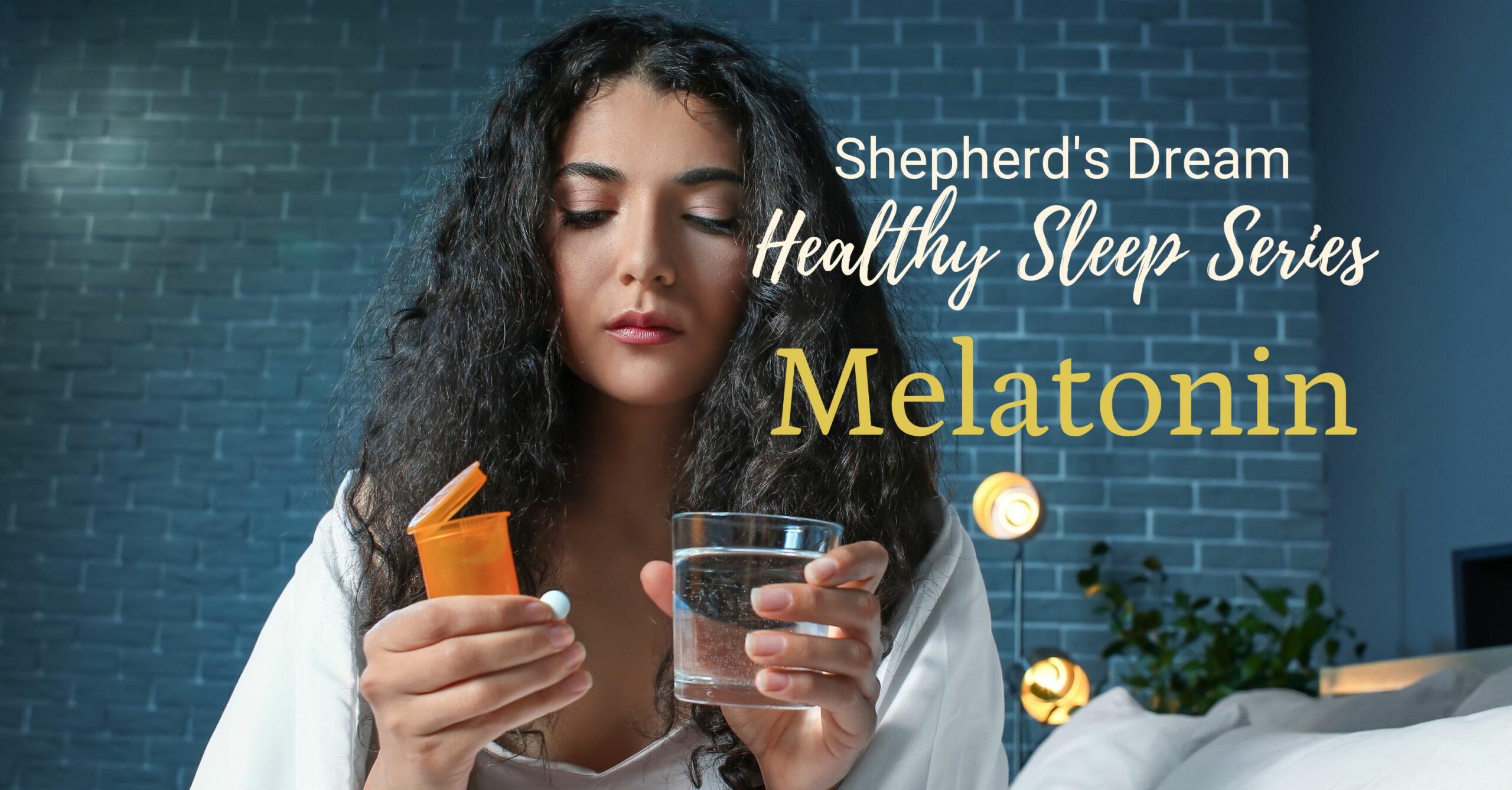Shepherd’s Dream Healthy Sleep Series: Melatonin
For the first installment of our Healthy Sleep Series, we’re exploring one of the best-known hormones associated with sleep—melatonin.
Melatonin—The Master Sleep Hormone
Melatonin is a hormone our brain produces naturally in the pineal gland, deep in the center of our brain. It is secreted in darkness and sensitive to light, and is thus connected to our daily rhythms and the amount of sun exposure we receive. This is also why sleeping in a dark bedroom is important.
Many issues can arise when melatonin production is disrupted:
- Delayed sleep phase— The entire sleep phase is shifted, sleep is delayed by at least two hours, and waking time is later as well.
- Insomnia— An inability to fall or stay asleep.
- Jet Lag— Travel-induced sleep and alertness issues produced by traveling.
- Shift Work Disorder— Sleep disruption caused by working overnight hours.
Ancient Bodies, Modern Challenges
The challenge is that most of us live the majority of our days away from natural light and immersed in lots of artificial light. Artificial indoor lighting (especially fluorescents) and the blue light from computer, phone, and device screens can interfere with our melatonin production. When we experience this disruption, it can create a cascade that knocks other systems off balance, affecting blood sugar regulation, hunger signals, and our ability to maintain a healthy weight, among many other things. It’s also a player in Seasonal Affective Disorder (SAD) when people experience depression due to shortened days and longer nights.
In addition, natural melatonin production appears to decline as we age, which can contribute to later onset sleep issues. With all of this in consideration, it’s easy to see why melatonin is one of the most popular supplements on the market.
Melatonin Supplementation
Capsules, liquid, dissolving tablets, and even gummies…melatonin supplementation comes in all sorts of forms and flavors.
Melatonin supplementation, while mostly safe and effective, is not without potential issues. Melatonin is a hormone, not a sedative—taking melatonin successfully requires proper dosage and timing, and is most effective with a holistic sleep hygiene program. It can produce a hangover effect, including daytime drowsiness, confusion, disorientation, and mild anxiety. Those with autoimmune conditions shouldn’t supplement with melatonin, and it has many known drug interactions (here’s a handy list from The Mayo Clinic to learn more).
Luckily, for those who prefer a more natural approach, nature offers elegant solutions—simple lifestyle tweaks and foods containing melatonin.
Lifestyle Hacks for Melatonin
Because our melatonin production is dependent on natural cycles of light and dark, this is an obvious place to begin. A few simple things to consider throughout your day:
- Get outside. Many of us spend way too much time inside, robbing our body of a crucial part of its circadian rhythm. Studies indicate that morning light is especially effective at helping with sleep regulation and melatonin production, but getting out for 15 minutes during your lunch break or going for that after-dinner walk are also helpful.
- No screens or extraneous light in the bedroom. Lots of folks have TVs in their bedrooms or bring their tablets and phones to bed with them. The blue light emitted from these screens, not to mention the potential stimulation or stress they may cause, signals your brain not to secrete melatonin, thereby disrupting sleep. Be sure to eliminate any extra sources of light like nightlights or bright digital displays as well.
- Consider mimicking natural light cycles. Lower the lights when it begins getting dark—maybe even go to candle light for that extra romantic touch! You can also try those amber-tinted eyeglasses to help screen out blue light if you’re especially sensitive.
A Melatonin-Friendly Diet
Many healthy foods that are readily available contain melatonin, including many of those traditionally associated with helping us sleep. And then there are a few specialty foods that might be new to you—give them a try and shake things up in your kitchen! All of these foods are great sources of naturally-occurring melatonin, so give them a try for dinner or dessert and see if it helps ease you into better sleep.
- Eggs— One of the greatest food-based sources of melatonin, eggs are also an affordable, convenient and versatile food. All animal food products contain melatonin to varying degrees, but eggs also contain a good amount of tryptophan, another sleep helper we’ll talk about in another post in the series.
- Milk— Yes, the classic warm milk before bed is legit. Either cold or warm, milk is a melatonin powerhouse. Interestingly (and logically), cows milked at night produce more melatonin in their milk. Unless you’re getting it straight from the source, it’s impossible to know, but luckily it’s still a solid choice for those who consume dairy.
- Fish— Coming in with more melatonin than meat, fish also provide brain-healthy omega-3 fatty acids and sleep-assisting tryptophan.
- Nuts— All nuts contain some melatonin, but pistachios and almonds come out on top, making them a naturally great choice for vegans.
- Tart Cherry— Leading the specialty food category, tart cherries are a big melatonin win. Consider adding our Magic Melatonin Mocktail to your nighttime self-care sleep rituals before bed—recipe here!
- Goji Berries— Another exotic superfood that isn’t common to everyone’s daily menu, goji berries can add a special touch to dinner salads and desserts. Who said developing a sleep hygiene routine had to be boring?
Stay tuned for the next installment in our Healthy Sleep Series—Tryptophan and Serotonin!

